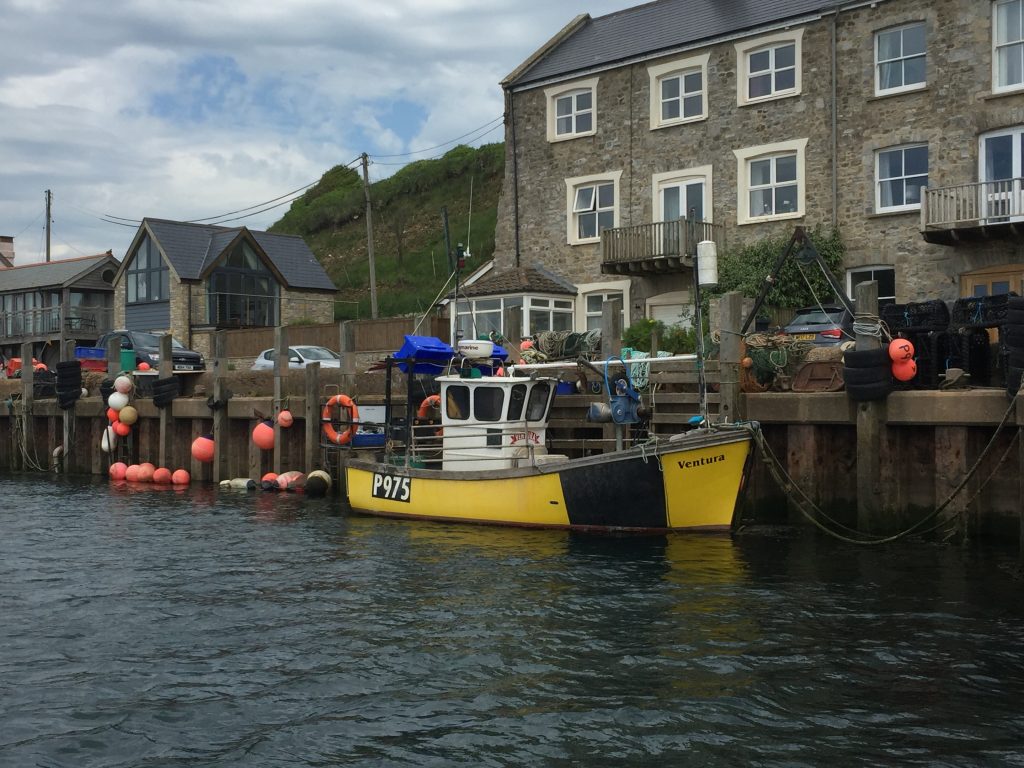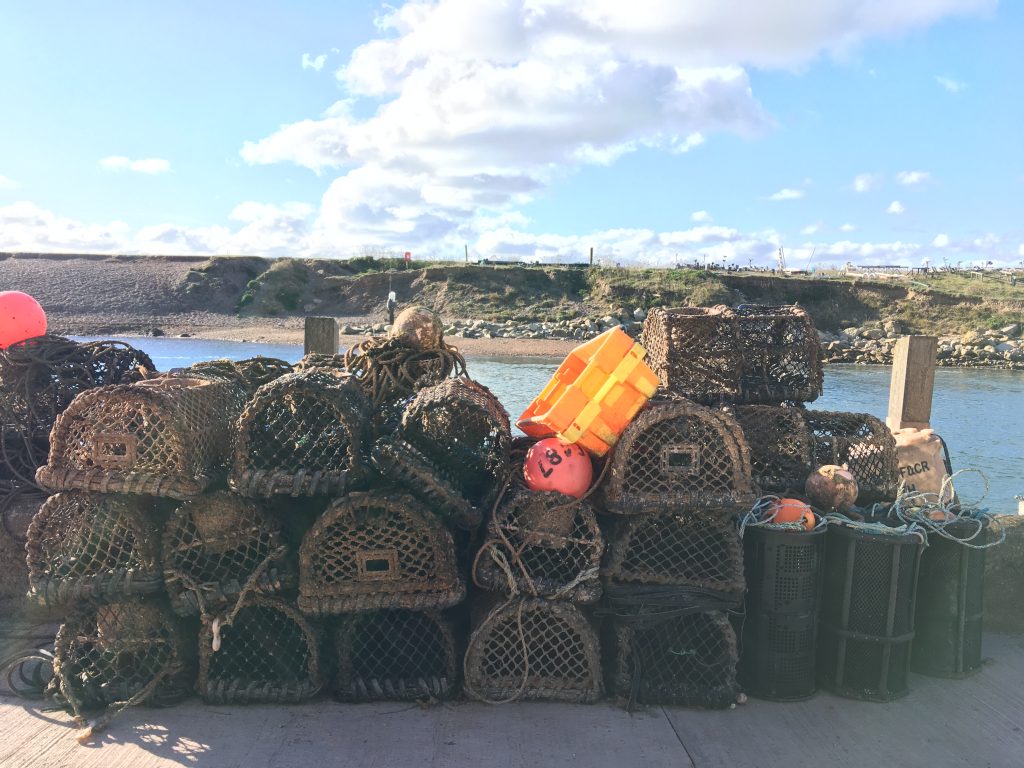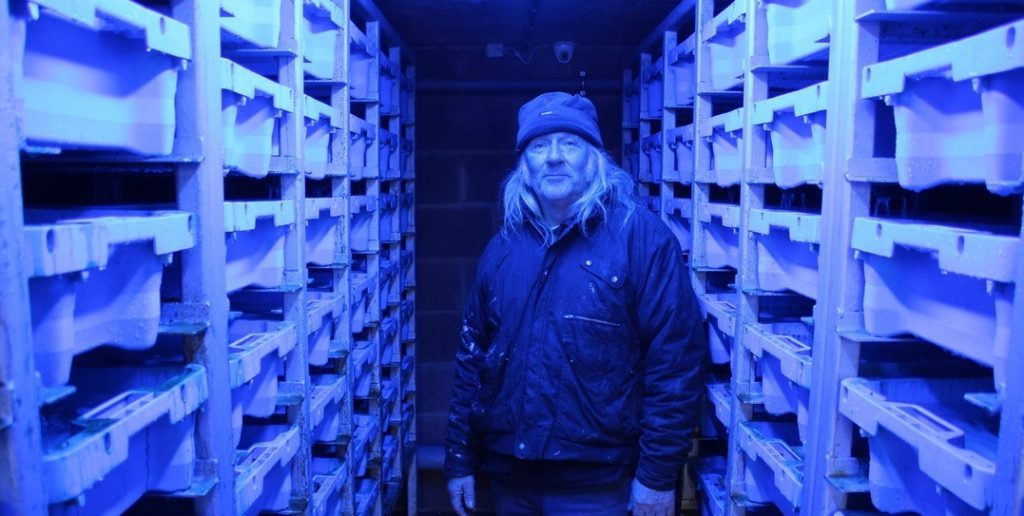Tim Glover, BLUE’s UK Projects Adviser, discusses the importance of the opening of the Axmouth lobster store, funded by BLUE, to the local fishing community
The small port of Axmouth, in Devon, has come up with a reliable solution to the variability of the weather and of shellfish prices – a lobster store.
Axmouth Harbour is one of the four ports in BLUE’s long-established project, the Lyme Bay Fisheries & Conservation Reserve. It is steeped in boatbuilding and fishing history with evidence of the presence of Vikings a millennium ago.

Lobster, crab and whelks form the major share of landings from the 12 vessels fishing from the harbour and these are caught in accordance with a voluntary code of conduct which sets limits on the number and type of pots which may be fished. Lobsters represent a high-value harvest for Axmouth, but fishermen face a number of challenges in both catching them and achieving the best market price.
When the wind blows hard from the south the Axmouth Harbour entrance is normally impassable, so boats cannot get out to fish. If this coincides with well-known spikes in lobster consumer demand such as Valentines Day, Christmas and Chinese New Year, fishermen can lose a lot of income through not being able to take advantage of premium prices. Traditionally, fishermen have tried to get over this obstacle by catching the lobsters and then holding them, 15 or 20 at a time, in “store pots” anchored offshore, so that they can be brought ashore when the weather allows and when the market price is favourable.
The problem is that if a storm blows up these pots can be lost and as they cannot escape, the lobsters will die – a total loss for the fishermen and a wasteful dent in lobster stocks. If the storms don’t get them, sometimes the bands put on their claws to stop them damaging the others will break and those now armed and dangerous animals will likely kill their companions. Add the occasional poacher to the mix and we can see that this method of storing lobsters is not ideal. Keeping them in the protected harbour might seem to be a sensible solution, but unfortunately the fresh water of the River Axe flows into the harbour and the drop in salinity would kill the lobsters.

The East Devon Fishermen’s Association, led by assistant harbourmaster Angus Walker, hit on the idea of building a state-of-the-art lobster store and approached the Dorset and East Devon Fishermen’s Local Action Group (FLAG) for a grant. They agreed to fund 60% of the £42,000 cost and BLUE agreed to finance the balance.
The block-built structure contains a storage system capable of holding about 1000 lobsters. A plastic seawater tank with a capacity of 15,000 litres was lowered and secured into the harbour wall below the water level at low tide. A ceramic-built, solid-state pump –able to circulate 17,000 litres per hour – drives the system. In operation a steady flow of seawater is led to a pod-system of units holding a total of 140 tanks. Seawater absorbs oxygen better on a temperature scale from five to ten degrees centigrade, a span at which the metabolism of lobsters is at its least. Chilling the seawater to that level is a challenge at most times of the year and three chilling machines have been fitted to achieve it. The units are chiller/heaters and should there be very cold conditions, the units warm the seawater to stay within the chosen temperature range.
The seawater can be changed when necessary but with a bio-filtration system, holding scallop shells and bacteria which digest faeces and other waste, meaning that there is no need to regularly change the seawater. All aspects of the system – power supply, salinity, flow rate and temperature – have fail-safe systems so the chances of fatalities among the lobsters are remote. The lighting inside the store is blue to make the transition from the bottom of the seabed less stressful for the lobsters, which otherwise could lead to lack of condition and sometimes death.

The Axmouth lobster store, which was officially opened on 14 January, is the latest example of collaborations between fishermen and BLUE which bring significant benefits to both the livelihoods of low-impact, artisanal fishermen and the ongoing conservation of fish stocks.
Tim Glover, BLUE’s adviser on UK projects, says “supporting the building of a lobster store is a natural progression for a conservation project in that it will prevent the unnecessary mortality experienced with the old method of risky storage at sea. Fishermen will also be able to optimise income by deciding when to take lobsters to market, thereby helping to keep important artisanal fishing communities alive and thriving.”

















